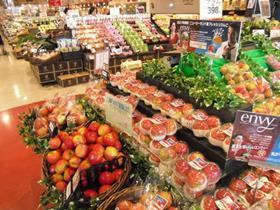
The Japanese market has always been a notoriously tough one to crack for apple imports, but New Zealand exporter Delica and its supply partner Enza are carving a niche in the off-season to local production.
Following on from their successful trial shipments of New Zealand Jazz and Envy apples to Japan last year, the partners are looking to expand the programme significantly for the 2012 season.
The first containers of new-season Royal Gala and Fuji apples are on the water and due to arrive in Japan today (29 May), and they will be followed swiftly by shipments of Enza’s proprietary Jazz and Envy varieties.
The biggest hurdle to entry is the strict quarantine protocol for New Zealand apples, which incurs significant compliance costs. In order to address Japan’s concerns over the codling moth pest, shipments must be sourced from registered growers, fumigated with methyl bromide and undergo cold treatment for 25 days. They also have to be inspected and approved by a Japanese inspector.
Delica and Enza jumped through these hoops last year in response to strong interest from a Japanese customer who had sampled Jazz and Envy in 2010 at Asia Fruit Logistica trade fair in Hong Kong.
The partners managed to export seven containers of the varieties, which were well received, prompting increased orders for 2012, according to Sarah McCormack, Delica’s apple sales manager. This year, the company could send 60-70 containers providing the fruit passes the rigorous protocol and inspection process, she says.
“Last year, we shipped only Jazz and Envy; both are very robust varieties with great shelf life and we had no issues with out-turn. This year we’re also sending small volumes of Royal Gala and Fuji,” McCormack explains. “We’re hoping that the protocol can be relaxed in the future.”
In a positive step, the Japanese government has approved a New Zealand MAF inspector to complete the quarantine inspection process from approved facilities this season, whereas last year the industry had to pay for a Japanese inspector to be in New Zealand for all three months of the programme.
McCormack says the effort and expense entailed in shipping to Japan are worthwhile, not least because of the premium this market tends to pay, although she adds that most of that premium is currently whittled away by the higher costs of meeting market access requirements.
In order to accommodate the increase in demand this season, Enza has built a fumigation chamber in the Hawke’s Bay specifically for the Japanese market, an investment that also reflects the partners’ confidence in the future of this trade.
While Delica and Enza enjoyed exclusivity on the Japanese market last year, they’ll be joined by a few other New Zealand exporters this year. New Zealand apples can fill a gap in supply during the off-season to domestic production, and market demand is reportedly higher this year following a drop in volumes of local Fuji whose production was down by an estimated 30-40 per cent due to low fruit set. McCormack is undeterred by the potential competition though.
“We’ll be first up there, we’re the only ones with Jazz and Envy, and we’ll be looking to give as many Japanese consumers as possible the chance to sample their unique taste,” she says.
Delica and Enza, which are this year working with four different importers, will be running retail promotions with their customers focused on in-store tastings and consumer education.
Innovative high-end supermarket chain Yaoko has been a pioneer in introducing New Zealand apples to consumers, according to McCormack, who notes that this retailer and others are promoting the fruit as a refreshing, crunchy snack to be enjoyed as an addition to the summer fruit offering for their customers.



